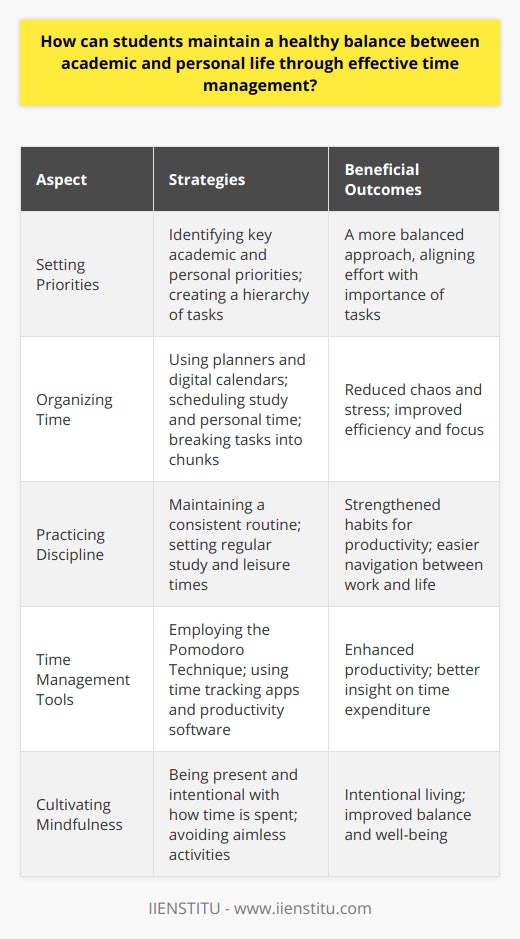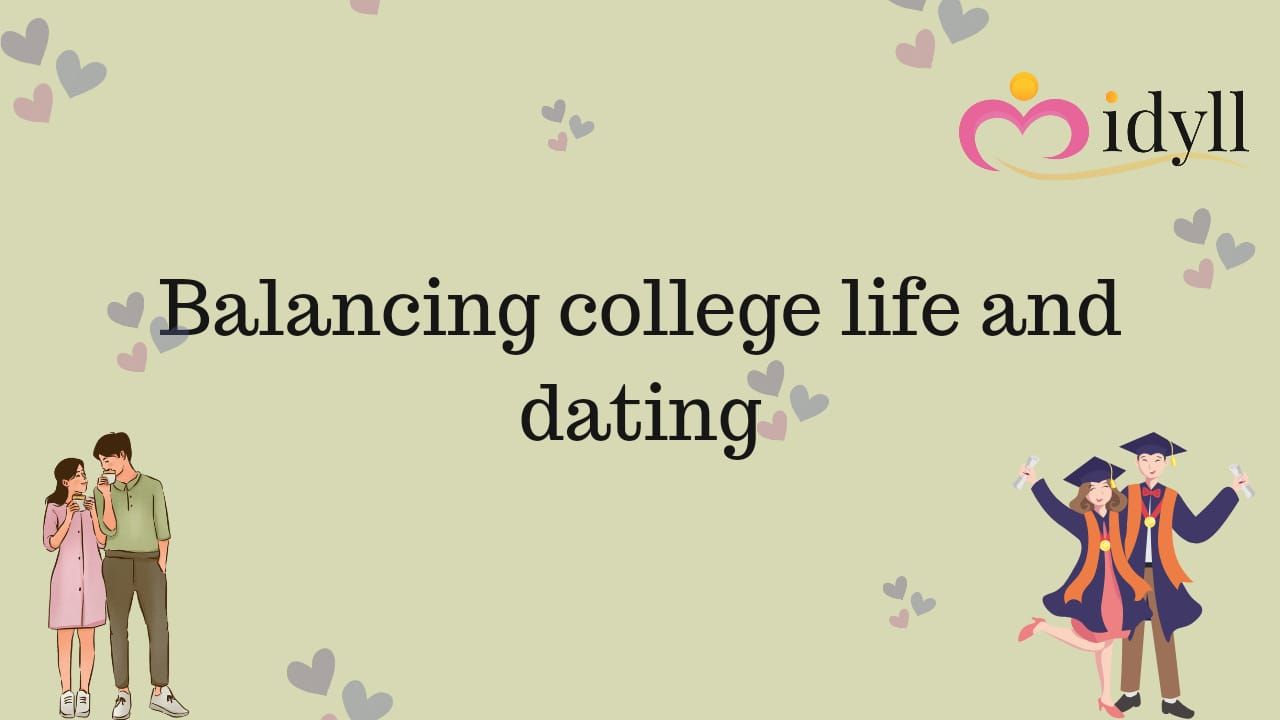
Understanding the Challenges of Balancing Dating and Studies
Importance of Time Management
Mastering time management is crucial for students who juggle dating with their studies. Without it, deadlines can slip, and relationships may suffer. Students often find themselves overwhelmed by competing commitments, leading to stress and frustration.
To effectively manage time, they can:
- Create to-do lists for both academic and social obligations
- Use digital calendars to track important dates
Impact of Relationships on Academic Performance
Relationships can significantly influence academic success. For instance, a supportive partner can motivate a student to excel, while distractions from dating can lead to missed deadlines.
Personal experiences show that students who maintain clear boundaries regarding study time and dating tend to perform better academically. Balancing these aspects requires ongoing dedication and communication, but it’s essential for achieving both personal and educational goals.

Setting Priorities
Identifying Academic Goals
When balancing studies and dating, identifying clear academic goals is vital. It serves as a roadmap for students, guiding their focus amid distractions. For example, setting targets like maintaining a specific GPA or completing assignments ahead of schedule can help prioritize tasks effectively.
To clarify academic objectives, consider:
- Short-term goals (e.g., completing a project)
- Long-term goals (e.g., graduating with honors)
Establishing Relationship Expectations
Equally important is establishing relationship expectations. Clear communication about each partner’s priorities helps avoid misunderstandings. For instance, if one partner dedicates significant time to studies, the other should understand and support that drive.
Some helpful practices include:
- Discussing time commitments upfront
- Setting date nights to balance time together with academic demands
By aligning academic goals with relationship expectations, students can foster both personal growth and healthy partnerships.

Communication is Key
Open Dialogue with Partner
Continuing the journey of balancing dating and studies, open dialogue with a partner is essential. Regular conversations about each other’s schedules and feelings can significantly strengthen the relationship. For example, discussing busy weeks can lead to understanding and support rather than frustration.
Key tips for effective dialogue include:
- Sharing daily or weekly commitments
- Expressing concerns without blame
Managing Expectations
Equally important is managing expectations. Both partners should be on the same page about what their relationship can withstand during heavy study periods. For instance, if one partner needs to focus extensively on exams, it’s crucial to set realistic dating expectations without guilt.
To manage expectations effectively, consider:
- Setting regular check-ins to reassess needs
- Being honest about emotional and academic pressures
By fostering open communication and clarity, students can build stronger relationships while maintaining their academic performance.

Effective Time Management Techniques
Creating a Study Schedule
To maintain balance between dating and studying, creating a study schedule is essential. This structured approach can dramatically increase productivity while relieving last-minute stress. For instance, a student might allocate specific blocks of time each week dedicated solely to studying for exams.
To create an effective study schedule:
- Break down material into manageable sections
- Include regular breaks to avoid burnout
- Use tools like planners or apps for reminders
Allocating Quality Time for Dating
Equally as important is allocating quality time for dating. It’s vital to carve out meaningful moments with a partner amidst busy schedules. For example, planning a weekly date night can ensure that both partners stay connected.
Tips for prioritizing dating include:
- Scheduling activities in advance
- Being present during date time by limiting distractions
By intentionally balancing study time with quality relationship moments, students can cultivate a fulfilling life both academically and personally.

Utilizing Resources for Support
Seeking Guidance from Counselors
As students navigate the demands of academics and dating, seeking guidance from counselors can be incredibly beneficial. Counselors can provide strategies for managing stress and finding balance. For instance, speaking with a counselor about study habits and relationship dynamics can offer fresh perspectives and helpful techniques.
Consider these benefits of counseling:
- Confidential support for academic pressures
- Conflict resolution strategies for relationships
Leveraging Supportive Relationships
In addition to professional guidance, leveraging supportive relationships with friends and family is vital. These individuals can provide a sounding board and emotional support in times of struggle. For example, confiding in a close friend about study stress can alleviate pressure and offer validation.
To make the most of supportive relationships:
- Schedule regular catch-ups with friends
- Share experiences to build camaraderie
By actively utilizing available resources, students can navigate the complexities of balancing dating and studies, ensuring they thrive both personally and academically.

Self-Care and Personal Well-Being
Stress Management Strategies
To successfully balance dating and studies, prioritizing self-care through effective stress management strategies is essential. Simple practices can transform overwhelming situations into manageable ones. For example, engaging in regular exercise or practicing mindfulness can significantly reduce anxiety.
Consider these stress management techniques:
- Deep breathing exercises for quick relief
- Planning leisure activities to unwind
Importance of Me-Time
Equally important is recognizing the value of “me-time.” Taking personal time away from both studies and relationships allows for reflection and rejuvenation. For example, dedicating a few hours weekly to indulge in hobbies can improve overall happiness and focus.
Some effective ways to incorporate me-time include:
- Reading a favorite book
- Practicing a favorite hobby or sport
By embracing self-care and personal well-being, students can enhance their capacity to engage meaningfully both in their studies and relationships, leading to a more balanced life.

Handling Challenges and Conflicts
Dealing with Conflicting Priorities
In the journey of balancing dating and studies, conflicts are inevitable. Dealing with conflicting priorities can feel overwhelming. For instance, when a study deadline coincides with a partner’s big event, it may create tension.
To navigate these conflicts effectively, consider:
- Openly discussing your commitments with your partner
- Prioritizing tasks based on urgency and importance
Resolving Relationship Issues Amicably
When relationship issues arise, resolving them amicably is vital. Healthy communication fosters understanding and strengthens the bond. For example, if one partner feels neglected due to academic pressure, addressing the concern can lead to solutions rather than resentment.
Strategies for amicable resolutions include:
- Using “I” statements to express feelings
- Setting aside time for calm, constructive conversations
By thoughtfully addressing challenges and conflicts, students can maintain harmony in their relationships while excelling in their studies, fostering a supportive and nurturing environment for both personal and academic growth.

Seeking Balance and Flexibility
Adapting to Changing Circumstances
As life unfolds, students often face changing circumstances that require adaptability. Whether it’s unexpected assignments or relationship dynamics, flexibility is key. For example, a last-minute project can shift study priorities, necessitating an adjustment in date plans.
To adapt effectively, try:
- Embracing a “plan B” for your schedule
- Regularly reassessing commitments
Finding Harmony in Dating and Studies
Ultimately, finding harmony in dating and studies is about creating a balance that works for both partners. It’s about mutual understanding and support. For instance, agreeing to study together or scheduling breaks for quality time can lead to harmony.
To achieve this balance:
- Communicate openly about needs and adjustments
- Celebrate each other’s successes, both academically and personally
By seeking balance and flexibility, students can cultivate fulfilling relationships while thriving in their academic pursuits, leading to a more enriched and satisfying life overall.
